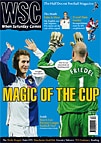 English reaction to Fabio Capello’s arrival has bemused his compatriots, as Matthew Barker reports. Some wonder how a man used to the best will cope with English talent – a problem other foreign coaches face
English reaction to Fabio Capello’s arrival has bemused his compatriots, as Matthew Barker reports. Some wonder how a man used to the best will cope with English talent – a problem other foreign coaches face
Italian reaction to the appointment of Fabio Capello as England coach was, in fairly quick succession, pride, bemusement and a smattering of scepticism. Often deemed a cold, haughty northerner (Capello hails from the Bisàsco region, near the border with Slovenia), the former Real Madrid boss had been steadily winning over a new breed of fans during a stint as guest pundit on state broadcaster RAI’s Domenica Sportiva show. Certainly his entertainingly forthright views and surprisingly chatty demeanour put him noticeably at odds with another apparent candidate for the Soho Square hot seat, Marcello Lippi, who, when coaxed off his yacht for co-commentating duties with Sky Italia, is often disappointingly uncomfortable and wooden.
Capello’s new-found goodwill, plus a strong sense of national pride that an Italian had been chosen for a job that, all scoffing aside, is actually still seen as a hugely romantic one, saw a generally heartfelt chorus of “good lucks” in the country’s press. The current England squad tend to be regarded as naively wedded to 4-4-2 at best; at worst an unlovable collection of overpaid, underachieving spoilt brats, all too ready to choose club over country.
With increasingly lurid stories of X‑rated webcam shenanigans and drunken Christmas parties surfacing at the time of Capello’s first press conference, the word disciplina regularly cropped up in appraisals of Don Fabio’s working practices and expected approach to his new charges. Doubts remain as to whether players will really be prepared to toe the line (unfairly perhaps, a few commentators pointed to Jamie Carragher’s withdrawal from the international game) and, equally, whether they have the nous and wherewithal to cope with a change of tactics during the course of a game.
Yet for all the concerns about the excesses of the players, it was those of the English press that caused the most consternation. Taking a break from the usual sniping with their Spanish counterparts, the Italian sporting press switched its attentions to English coverage of Capello’s appointment. La Gazzetta dello Sport complained about lazy stereotypes (all those Godfather headlines), before promptly likening “Capello mania” to Julius Caesar, conquering the English with ease.
Corriere della Sera, the news daily of choice for well heeled northern borghese, was aghast after the Times devoted an editorial to the arrival of the Italian, while eyebrows were raised following the writing of profiles detailing, along with all those visits to the Prado, Capello’s apparent sympathy for right-wing politics (his chumminess with Berlusconi; his sneaking admiration for Franco). Italy may be the birthplace of the paparazzo but, in the sports pages at least, prying into an individual’s private life (including their political views) is a real no-no. “They’ve started,” warned La Gazzetta. “This is what they did to Eriksson.”
Capello’s intention to get his English up to scratch within a month was widely reported, with La Repubblica putting it most succinctly: “His English can only improve. The same can be said of his new squad.” Few believe Capello has an easy task when it comes to moulding a decent squad. Asked by Corriere della Sera if he had been watching much Premier League action, the former Milan man enthused about December’s “Grand Slam Sunday” clashes involving the top division’s leading pack. When reminded that fewer than 11 players involved in the games were actually eligible for international duty with England, Capello could only smile in reply.
The dearth of native playing talent at his disposal has prompted some (Lippi inc-luded) to question whether the Italian will be able to adapt to the different demands of international management. Capello, the argument goes, has always inherited a strong squad at club level, able to make the odd big‑money tweak and impose his own will at the Bernabéu, Olimpico and Meazza. That the FA were seemingly so willing to allow Capello to work with a near-exclusively Italian coaching staff caused some surprise, although, having sifted through the available English alternatives, most concluded it was much the best option.
There’s a sense that Capello has been given all that he wanted, that he has little to complain about should things not go immediately to plan. He’s pretty much guaranteed a long honeymoon and will doubtless be more than happy to allow David Beckham to hog the spotlight ahead of the forthcoming friendly with Switzerland. Of course the real nightmare scenario is for Roberto Donadoni’s Azzurri to fail miserably at Euro 2008 while England enjoy an upswing in fortunes. It surely wouldn’t take long before grumbles in the Italian press began to surface about “Mister” Capello betraying his homeland. Il lavoro impossibile – the impossible job – could see the former Milan man under pressure from more than one demanding football press and public.
From WSC 252 February 2008